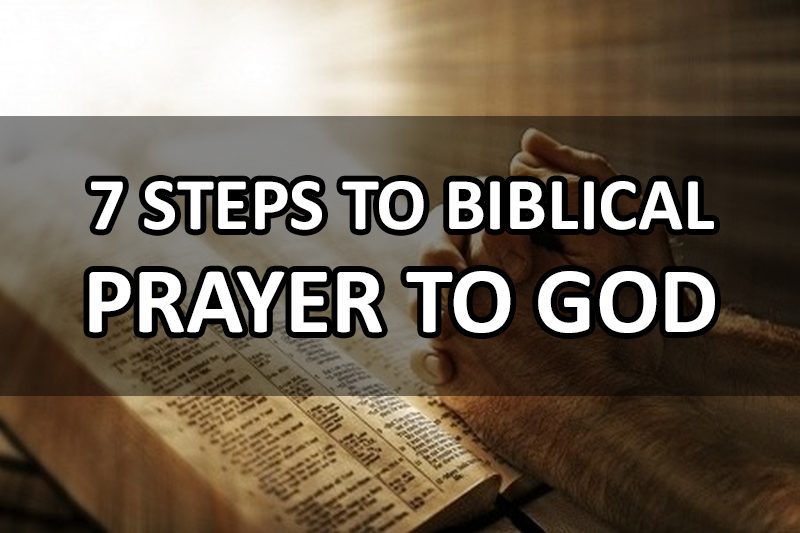Many people, especially new Christians, might not really know how to pray to God. However, even mature Christians who have been Christians their whole lives may not really be fully aware how God wants us to pray.
- The Lord’s Prayer
- Framework for prayer
- Step 1) Begin prayer with praise to God
- Step 2) Acknowledge the coming Kingdom of God
- Step 3) Humble yourself and acknowledge that God’s will is above yours
- Step 4) Ask God for your daily needs
- Step 5) Ask for forgiveness, and forgive others
- Step 6) Ask God for protection from evil
- Step 7) Acknowledge God’s authority and power, ending in praise to God
- More things to pray to God about
Fortunately, Jesus gave us a framework for praying to God, and I will break it down here in this article. In Matthew 6, verses 5 through 15, Jesus gives explicit instructions on how to pray to God. Here are the verses (ESV):
The Lord’s Prayer
7 And when you pray, do not heap up empty phrases as the Gentiles do, for they think that they will be heard for their many words. 8 Do not be like them, for your Father knows what you need before you ask him. 9 Pray then like this:
Our Father in heaven,
hallowed be your name.
10 Your kingdom come,
your will be done,
on earth as it is in heaven.
11 Give us this day our daily bread,
12 and forgive us our debts,
as we also have forgiven our debtors.
13 And lead us not into temptation,
but deliver us from evil.
14 For if you forgive others their trespasses, your heavenly Father will also forgive you, 15 but if you do not forgive others their trespasses, neither will your Father forgive your trespasses.”
(Matthew 6:5-13, ESV)
While the ESV version does indeed make the original King James version easier to understand, it is bothersome that they fully removed the second half of verse 13. However, I will not be going into how many versions have removed parts of the Bible, since this post is just about how to pray. So I will just post what the The King James version has for verse 13:
“13 And lead us not into temptation, but deliver us from evil: For thine is the kingdom, and the power, and the glory, for ever. Amen.”
(Matthew 6:13, KJV)

Framework for prayer
Based on the Lord’s Prayer, Jesus gives us a template for prayer. While memorizing and praying the Lord’s Prayer word for word can be fine, the truth is after you said it so many times, it gets harder and harder to mean every word, because it becomes merely a ritual. Often I found myself repeating over and over verses as I continued to pray it, realizing that I wasn’t focusing on the meaning of the words because it has become such repetition.
God does not want us to meaninglessly recite a verse without meaning every single word from the heart. What if when you spoke to your friends you just said the same phrase every time you saw them? It wouldn’t mean anything, and certainly would not help you grow in your relationship with your friend by just reciting a few phrases.
In fact, God talks about this. In Matthew 15:8, Jesus said: “This people honors me with their lips, but their heart is far from me”. Jesus was quoting this verse actually from Isaiah 29:13 which said the same.
Prayer as a form of worship
The context of Matthew 15:8 was in reference to people worshiping God mindlessly. For example, many people who go to church and sing during worship, but only because they like to sing. They are not meaning every word and consciously devoting it to God.
Prayer can also be a form of worship. Thus, this verse also applies to prayer. Mindlessly reciting the Lord’s prayer is like talking to the wind. Completely pointless.
It is important, then, understanding humanity’s tendency to convert repetition to mindless ritual, to understand the heart of why Jesus taught us to pray like this. Therefore, I will break down the reasons why Jesus wanted us to pray like this by going verse-by-verse and explaining the meaning.

Step 1) Begin prayer with praise to God
hallowed be your name.
(Matthew 6:9)
Jesus says to being our prayer to God with praise. the word “hallowed” means, essentially, “holy”. For example, you could say “Holy are you God”, which means about the same. The important thing is to acknowledge God’s greatness and holiness and praise his wonderful name. This is how we are to begin prayer.
Step 2) Acknowledge the coming Kingdom of God
(Matthew 6:10)
This one was a bit more difficult to grasp. According to reference.com, this could mean that by acknowledging the second coming of Christ and the new kingdom that will be established, it can help to focus our minds on the mission of serving God for the coming kingdom of Heaven, instead of living for ourselves here on earth.
Step 3) Humble yourself and acknowledge that God’s will is above yours
on earth as it is in heaven.”
(Matthew 6:10)
Jesus often was quoted expressing the importance of doing the will of God. Even in the Garden of Gethsemane when Jesus was praying to God when he was about to be arrested to be ultimately executed, Jesus prayed to God, “Father, if you are willing, take this cup from me; yet not my will, but yours be done.” (Luke 22:42) Even Jesus, the Son of God, saw it of great importance to clarify that God’s will is the most important.
Step 4) Ask God for your daily needs
(Matthew 6:11)
Life was simpler in Jesus’ day 2,000 years ago. There were no computers, smartphones, or other distractions. Often people had little more than fellowship with each other and modest meals consisting of not much more than bread and water.

I believe that here Jesus was expressing by “daily bread” was asking God for our basic daily needs. Not necessarily our wants, but our needs. This doesn’t include getting the latest game system or new smartphone, but rather our daily sustenance, including food to live, possibly including money for rent (shelter), fellowship with others, and even sufficient sleep.
Asking God for our most basic needs acknowledges God as the ruler of our life, and it expresses a reliance on God rather than depending on ourselves for our own sustenance.
The Bible says in Matthew 6:26, “Look at the birds of the air; they do not sow or reap or store away in barns, and yet your heavenly Father feeds them. Are you not much more valuable than they?” If we truly trust God for our daily needs, then certainly we will not be left wanting.
What better way to grow this reliance on God than to at several times every day acknowledge that God is the provider, and express to God our reliance and trust in Him to provide for our needs?
Step 5) Ask for forgiveness, and forgive others
as we also have forgiven our debtors.”
(Matthew 6:12)
As Jesus further elaborated at the conclusion of this prayer in verses 14 and 15, Jesus gives a conditional statement: we will not be forgiven unless we forgive others. Just asking is not enough.
We need to go to God and spend time confessing our sins, asking God to reveal sins we might not be aware of, and praying for forgiveness. However, based on how we will only be forgiven by the measure of how much we forgive others, then we must search our hearts for any unforgiveness.
In Matthew 7:2 Jesus says, “For in the same way you judge others, you will be judged, and with the measure you use, it will be measured to you.”
I would suggest to ask God if there is anything you are not forgiving someone for, knowing that if you do not forgive them, then God will also not forgive you. Pray to God asking Him to reveal any unforgiveness in your heart.
What if it was a very heinous thing that was done to you? Some things took me years before I was ready to forgive them, but it took maturity and persistence and eventually I opened up my heart. However, I was lucky. What if you die tomorrow with unforgiveness? It will not be a good thing, for sure. So pray that God help you to truly forgive others, for anything, deep in your heart, and ultimately God will then forgive you for even the worst things you have done in the past.

I have found that the more I matured as a Christian, the easier it was to fogive others. Once my heart grew enough that I could forgive even the truly worst things that were done to me, and truly forgive them in my heart, I found that it is now much easier to forgive people for things when they wrong me.
However, you must make sure to daily go to God and make sure you aren’t harboring unforgiveness in your heart.
See this post to read more about how important forgiveness is: First Condition of Salvation: You Must Forgive Others In Order To Receive Forgiveness By God.
Step 6) Ask God for protection from evil
(Matthew 6:13)
Like trusting in God for our daily needs, trusting in God for His protection from evil expresses a reliance on God and a humility before Him. Additionally, sometimes in our weakness we can be led astray, and in doing so we become much more vulnerable to attacks from the evil one.
This is why it is important to ask God for protection and to watch over us, helping us not to be led into temptation or pulled astray, and asking God to protect us from the evil one. This doesn’t mean that we don’t hold some responsibility, however; but it does demonstrate an ultimate reliance on God for strength and an acknowledgement that we can’t do it all on our own.

Step 7) Acknowledge God’s authority and power, ending in praise to God
13 (KJV) “For thine is the kingdom, and the power, and the glory, for ever. Amen.”
(Matthew 6:13)
(Matthew 6:13)
It is important to note here that Jesus both began and ended the prayer with praise to God. This says a lot about what God wants from us when we talk to Him and spend time with Him.
An interesting thought is that in church, service is begun and ended with praise. I wonder if this tradition was began because early church leaders understood that it is best to begin and end communication with God with praise? It does seem that by Jesus choosing to being and end praise to God, that praise and worship is an important, even critical part of our communication with God.

In the writing of this, I do find it interesting that there are 7 steps. The Bible does a lot of things using certain numbers including 12, 3, and 7. For example, 12 tribes of Israel, 3 days before Jesus raised from the dead, and 7 days for God to create the universe. Anyway, that is besides the point, I just found it interesting.
Overall, by following these 7 easy steps for prayer, we can use Jesus’ framework as a template to our own unique prayers to God. It is not that difficult to remember, it is essentially to begin and end with praise, acknowledge God’s sovereignty, and set your heart right before God. I would suggest to use the same order and format of your prayer, because this is how Jesus told us to.
Other things we can (and should) pray to God about
On the other hand, certainly these are not the only things that we can pray to God. Indeed, the Bible says to:
“16 Rejoice always, 17 pray without ceasing, 18 give thanks in all circumstances; for this is the will of God in Christ Jesus for you. (1 Thessalonians 5:16-18)”
Therefore while the Lord’s Prayer and using the format Jesus gave us is certainly important, it is really only the starting point of prayer. More experienced Christians should also be including things like praying for others, praying for even your enemies, praying in everything we do, praying for the world, praying for the lost, and praying about many other things.
See this post on 10 More Things To Pray To God About According To The Bible to read about 10 more things you can and should pray to God about.
And see this article on How God Can Shape Your Life And Help You Through Intense Daily Prayer | How To Pray To God: Part 2 to learn exactly how you can start developing the habit of prayer.




Thanks for the explanation of prayer I will really need help by always sending me some prayer points and it’s explanation.
Thank you for the explanation. It helps me to understand deeper about praying.